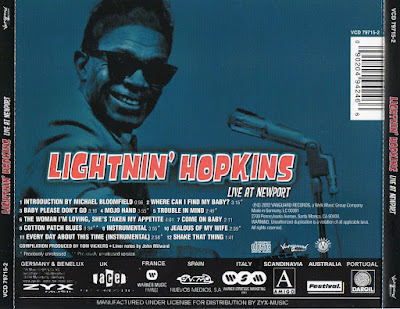Okay now here’s a beauty for a bright February day and thereby hangs a tale. Now bear with me but when I went to college (art school first) I went on Freshers week to the Student Union bar to have a drink and on walking in through one door found a blues man and accompanist stood on the floor by the door into the Common Room with just a couple of mikes and amps and playing up a storm. As I looked back I thought hang on a cotton picking minute that’s Lightning Hopkins! and I was hooked enough to get a drink and listen at his feet. So enthusiastic was I he smiled at us and introduced a young harmonic player with him as someone with the name ‘Blue’ in his title (not Sugar Blue for sure . . . ?) but I now cannot recall.They were awesome but I never learned whether it was in fact Lightning! It sure as heck sounded like him, but no stage and just playing amongst the tables that afternoon a set that I wish I had been able to document in some way. I have searched on line now and checked and it seems highly unlikely it was in fact Hopkins despite his being known to play the college circuits extensively in the States. The ‘Blue’ harp player I never found out about though at that time he seemed a teenager but superbly skilled. There seems to be no archive of who was appearing under the auspices of the Union but I maintain it was in fact the man himself. For anyone challenging this it would have been 1973. (Hopkins died in the 1982 - It should be noted his 'only tour' is listed as 1964 and there are no records of him at setlist.fm playing the UK in 1973) so I don’t truly know who it was . . . . . . . . any suggestions as to who it might have been gratefully rec’d!? This has confounded me for years and you may well say it was some local amateur but I swear it was someone famous and the real deal. If not Lightning then who?
Sam Hopkins was a Texas country bluesman of the highest caliber whose career began in the 1920s and stretched all the way into the 1980s. Along the way, Hopkins watched the genre change remarkably, but he never appreciably altered his mournful Lone Star sound, which translated onto both acoustic and electric guitar. Hopkins' nimble dexterity made intricate boogie riffs seem easy, and his fascinating penchant for improvising lyrics to fit whatever situation might arise made him a beloved blues troubadour.
Born in 1912 to a poor sharecropping family in the cotton country between Dallas and Houston, Hopkins left home when he was only eight years old with a guitar his brother had given him. He made his living however he could, sticking to the open road, playing the blues, and taking odd jobs when money was short.
Hopkins didn’t begin recording until 1946, when he was dubbed “Lightnin’” during his first session, and he soon joined Muddy Waters and John Lee Hooker on the national R & B charts. But by the time he was “rediscovered” by Mack McCormick and Sam Charters in 1959, his popularity had begun to wane. A second career emerged - now Lightnin’ was pitched to white audiences, not black ones, and he became immensely successful, singing about his country roots and injustices that informed the civil rights era with a searing emotive power.
Lightning Hopkins - Zerosounds
Recorded in 1965, "Live at Newport" captures Hopkins in a loose mood communing with an appreciative audience. The mostly solo electric set apparently didn't cause any controversy (as Dylan's electric set with the Paul Butterfield Blues Band would in 1965). The nice thing about the album is that all the material seems to have come from the same set, giving the listener a taste of what seeing Hopkins at Newport might have been like.
Good versions of "Baby Please Don't Go," "Trouble in Mind," and "Where Can I Find My Baby?" show up early in the set, and feature an intimate interplay between Hopkins and the audience. The latter part of the set rocks a bit harder by adding drums. The percussion pushes the energy level up a notch on "Jealous of My Wife" and "Shake That Thing," pieces that probably had old-timers boogying in the aisles. "Live at Newport" also includes several unreleased versions, making it a good album to add to one's Hopkins collection.
Lightnin Hopkins - Live At Newport 1965
(320 kbps, cover art included)
Tracklist
| 1 | Introduction By Michael Bloomfield | |
| 2 | Where Can I Find My Baby? | |
| 3 | Baby Please Don't Go | |
| 4 | Mojo Hand | |
| 5 | Trouble In Mind | |
| 6 | The Woman I'm Loving, She's Taken My Appetite | |
| 7 | Come On Baby | |
| 8 | Cotton Patch Blues | |
| 9 | Instrumental | |
| 10 | Jealous Of My Wife | |
| 11 | Every Day About This Time (Instrumental) | |
| 12 | Shake That Thing |
and his brothers!





No comments:
Post a Comment